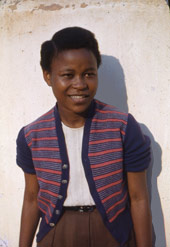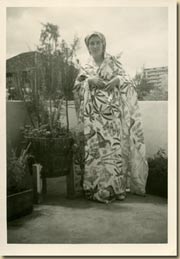“I found them…”

Dear Deolinda,
Today I found your letters.
 The last time I saw you it was March 1958, and I was among the small group of young missionaries leaving Angola after three unforgettable years among your people.
The last time I saw you it was March 1958, and I was among the small group of young missionaries leaving Angola after three unforgettable years among your people.
You and other African friends walked miles from your outlying Luanda homes to the distant airport to bid us farewell. We were leaving for a circular tour through Europe on our way home to our own U.S. soil.
As we boarded that plane, we carried with us so many rich memories of our time with you. We were scarcely able to acknowledge how much we had been changed by the experience. When we signed up for the short-term missionary assignment, we made a huge assumption that by spending a few short years in a land and culture unfamiliar to us, we would be effecting change in your lives.
And who could possibly have foretold the upheavals that in a few short years were awaiting you and all the beloved African friends who came to wave goodbye?
After more than fifty years, Luanda is undergoing major reconstruction: an infrastructure built upon years of war—first the war for independence from Portugal and then civil wars that raged on and on. Those became part of your story, Deolinda, when at age 28 you gave your life for the liberation of your people. One of the major new thoroughfares in Luanda in a now vibrant part of the city is named for you: Avenida Deolinda de Rodrigues. In Angola, your name is revered.
During the early years of my return to the U.S. you were evacuated to Brazil because of Angolan blacks' inexorable move towards independence from Portugal and the hostile stance that white colonial Portuguese were taking against you and other young people educated by the mission. That's when your letters began to come, pleading with me to write to you.
You were 15 and I was 21 years old when we met. I was the young supervisor of social services offered by the Luanda mission to Africans living in Luanda, mostly as squatters in crude dwellings scattered far away from the central business district.
I hired you as a day care teacher, and that was the start of our friendship.
I struggled with my Portuguese. You admonished me: “Menina Marcia, when you have something to say, your Portuguese is perfect.” You and other extremely bright Angolan youth loved testing your English on newly-arrived young Americans who wondered what they had to offer the people of this warmly welcoming land.
 In those years, you and others your age wore Western clothes. Your parents aspired for you to have a better life, and assumed that you need not speak the Kimbundu language of your forebears, only colonial Portuguese. But you began to find meaning in the old traditions, the old ways.
In those years, you and others your age wore Western clothes. Your parents aspired for you to have a better life, and assumed that you need not speak the Kimbundu language of your forebears, only colonial Portuguese. But you began to find meaning in the old traditions, the old ways.
You found a dressmaker who created the African “panos” of colorful lengths of fabric worn by Angolan women--one strip to tie the baby on her back, another folded over the short blouse designed for a nursing mother who could easily place her baby to her breast while she went about her daily tasks. The outfit came complete with a colorful headscarf and simple strings of beads. You had an identical set made for me.
After all these years, I will try to explain this sudden hunger to know more about what happened to you, and my need to understand the courage that was part of the amazing legacy of your short life: only 28 years.
It's all a mystery, beginning with my almost inexplicable decision to go to Africa in the first place. Having traveled no farther than 200 miles from the cotton fields of my native Texas, I signed up for this first job upon college graduation when I was 21.
The assignment began in the company of other eager young people also headed for Angola. Before we could obtain an entrance visa into that Portuguese territory of Africa, we were required to be fluent enough in the Portuguese language to pass the required language test. So instead of sailing for the “dark” continent, we took a detour to Portugal, and settled down for six months of language study in Lisbon. We lived in Portuguese homes, studied with private tutors and traveled around the country with other members of the missionary community on their way to Angola, eyes wide open to all the sights of that land.
Then we sailed for Africa to begin our three-year assignment in Luanda, the capital of Angola, or in the interior mission of Quessua.
It was life changing, to live among such warm-hearted people who managed to overlook all my foibles and shortcomings and accept my vague understanding of what it meant to live in another totally different culture. I came as part of the whole Protestant missionary enterprise that for years had been educating Africans within a largely Catholic setting of privilege for colonial Europeans. It was another chapter in the long history of appropriation of land and people all over Africa. As you well knew, the Portuguese in Angola were very active dealers in capturing and enslaving whole villages, shipping them off in miserable below-deck accommodations to my country, made up largely of European immigrants.
That history was just a moment in time when, in your time, you began to focus on Africa, your land of birth, in a poem that you left as part of your phenomenal legacy:
Mother Africa
Africa
Africa Mother
you gave birth to me from your womb
born of colonial soil
nursed by the milk of your breast
I grew
stunted but still I grew
rapidly into youth
like a star that falls across the sky
upon an ancestor's death
today I am a woman
I don't know yet if I will become an elder woman
but it is to you I return
Africa
Mother Africa
You who gave me birth
do not destroy me
nor strike me with your curse
otherwise, I have no future,
brutalized by my own mother.
I am Angola, your Angola
not linked to the oppressor
nor friend of the oppressor
nor the bastard child
that taunts you
they tumble into a trap
deceived
not able to distinguish truth from lies
by candid or secular force
now blind
as you are
Africa
Mother Africa
giving strength to the bastard brother
who suffocates me
knifes me in the back
The oppressor, the friend of the oppressor
your bastard child
(you, too, Mother Africa?)
turn away
from my dying breath
but Africa
Mother Africa
by your love you grant understanding
still I want to believe in you.
